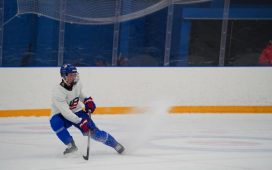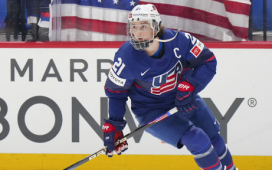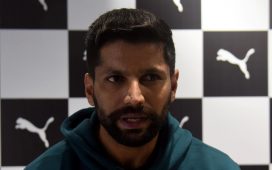“I think the Canadian win was an indication we could end up with something here,” Mayasich said. “I think we gained confidence from that and the experience, just realizing we all could do it. Maybe teams took us lightly, that could be a factor, too — the Canadians and the Russians. Home-ice advantage was a positive thing.”
Back in ’60, the Olympics didn’t have a medal round. The winner was determined by which team had the best record at the end of the final round, which was a six-team round-robin. Sitting at 4-0, the Americans had to beat Czechoslovakia in the final contest.
The U.S.-Czechs game was scheduled for 8 a.m. According to Bill Cleary, those who set up the schedule figured the de facto gold-medal game would be played between Canada and the Soviet Union at 3 p.m. The U.S. spoiled the party.
With an early start time, the U.S. struggled out of the gate and trailed 4-3 after two periods. Knowing a victory meant gold, the U.S. players woke up in a big way. The team put up six third-period goals, led by Roger Christian with a hat trick and Bob Cleary with a pair of tallies, to win 9-4.
“An interesting part at that time was if you got a penalty, you had to serve the two minutes even if the other team scored,” Bill Cleary said. “I think they got a penalty and we got two goals. Once we got that other one to tie it up, that set us off. We just kept attacking. And the Czechs are a great hockey team, let me tell you.”
The victory capped off a great celebration by the U.S. players and coaching staff. At the medal ceremony, Kirrane, the team captain, represented his team on the highest pedestal as his teammates stood close by.
“That was really one of the great moments when I sat there and watched Jack Kirrane,” Bill Cleary said. “This tough Irishman from Brookline [Massachusetts] with the jaw sticking out, tough as nails, and he was standing up there in the No. 1 position getting the gold medal. His knees were shaking, his hands were a pool of perspiration, and I said, ‘Look, that’s what it’s all about right there. That’s what it’s about.’ That’s what it meant to all of us.”
Of the 17 players on the U.S. roster, nine are living: Mayasich, Bill Cleary, McCartan, Meredith, Bill Christian, McVey, Dick Rodenhiser, Weldy Olson and Larry Palmer.
The guys hope taking home the gold medal made a big impact on the sport in the United States.
“I think it was an achievement that maybe propelled the growth of hockey in the U.S. and maybe had a big influence on what the ’80 team did and what players grew up with,” Mayasich said.
“Winning in ’60 elevated USA Hockey and what it’s about and all their programs and all the stuff that has come from it because of some wins and some very winning teams,” Meredith said.
Vairo knows the impact firsthand of the 1960 team.
“We didn’t have that many players playing hockey in our country, and they went out and won a gold medal with very little. Most of them had to give up jobs, put their military service on hold, their education on hold, and they played with all their heart for our country. I really admire that.”
Story from Red Line Editorial, Inc.








